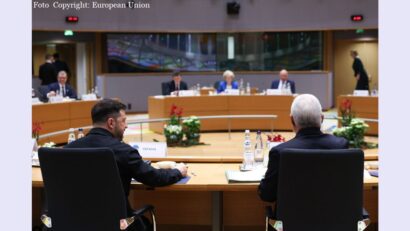The Romanian Diplomacy Annual Meeting
The annual meeting of Romanian diplomats, under way in Bucharest, is also being attended by foreign guests such as the EU foreign policy chief, Catherine Ashton, and the Moldovan and Georgian foreign ministers. The meeting is dominated by the Ukrainian cr
Bogdan Matei, 28.08.2014, 14:30
Held annually at the end of August, this year’s meeting of Romanian diplomats is taking place in the context of special international developments. The unexpected political and military crisis in Ukraine, the determination of the Republic of Moldova and Serbia to get integrated into the EU, the rekindling of the Middle East conflicts, namely in the Gaza Strip, Syria and Iraq and the top level changes in the organizational chart of NATO and the European institutions are some of the hot issues to be debated by the Romanian diplomats.
Also attending the meeting with the Romanian ambassadors and consuls were the PM Victor Ponta and the foreign minister Titus Corlatean. The two pleaded for diplomatic strategies adapted to the international context. Running for the autumn presidential election, the PM has frequently assumed the foreign policy prerogatives of the president.
Victor Ponta: “I believe Romania has once again proved that it is a solid partner of the EU, NATO and of its strategic partner, the US. In a crisis situation Romania has the opportunity to consolidate this status and assume it with more confidence and courage”.
Against the backdrop of Russia’s fresh imperialist drive, NATO needs to consolidate its eastern flank, including on the Romanian territory, says the foreign minister, Titus Corlatean: “Romania’s stand on the eastern neighborhood is likely to consolidate its role as important actor in the efforts meant to bring stability to the region, thus turning a potential vulnerability into a strategic advantage.”
As to the relationship between Romania and Ukraine, Romanian’s biggest neighbor in terms of territory and population, it has not been one of the most cordial, due to the conflict, settled in the Hague by the international court, in favor of Romania, and related to the delimitation of the Black Sea continental shelf. Kiev had the unfortunate idea of building a canal with a devastating impact on the ecological balance of Romania’s Danube Delta.
Another reason for conflict was the frequently discriminatory treatment of the Ukrainian authorities towards the Romanian ethnic population numbering half a million people and located in the west of Ukraine. However, given that over the past months Romania has firmly pleaded for the observance of Ukraine’s territorial integrity and sovereignty and supported the pro-western authorities in Kiev, the relationship between the two countries is likely to improve. And the Romanian foreign minister even speaks of concluding a partnership agreement with Ukraine.






























